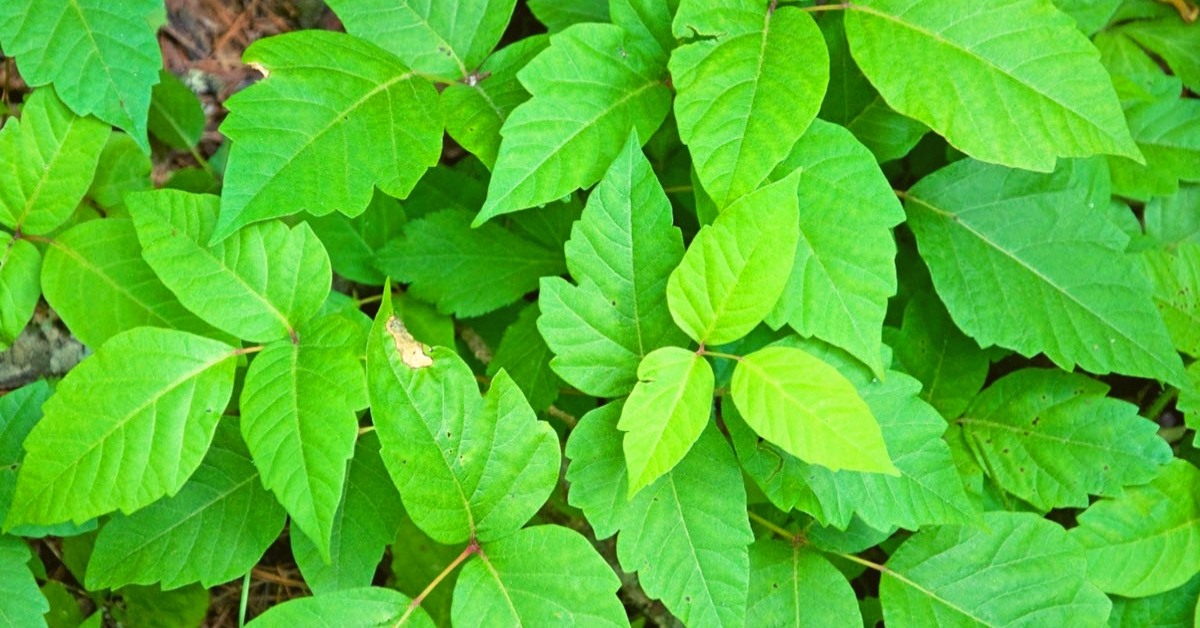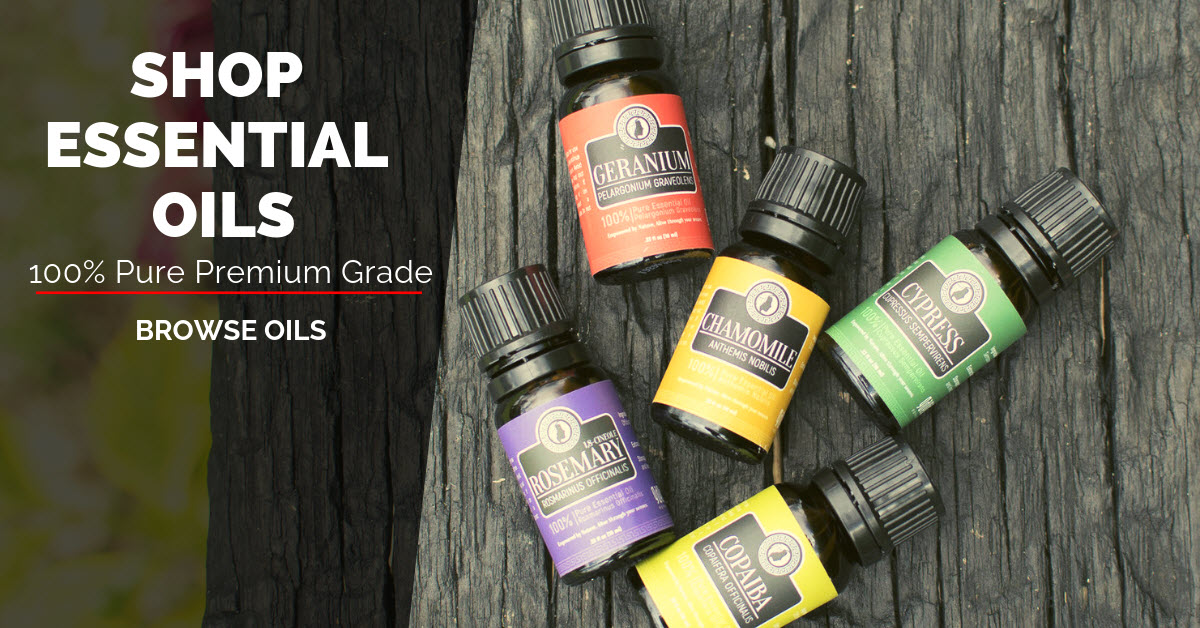If the mnemonic rhymes ¨Berries White, run in fright¨ or ¨Hairy vine, no friend of mine¨ mean nothing to you, you are probably not living in the US, Canada or Asia.
For people living there and, more specifically in the north and southeast part of USA, those rhymes may bring back some skin painful memories, especially if they are outdoor activity enthusiasts or have jobs that require them to be outdoors.
I am talking about Poison Ivy, a noxious plant that can cause an allergic reaction when it comes in contact with skin with various symptoms ranging from intense itching to red skin, rashes, inflammation, swelling, papules, blisters and crusting skin.
Why Essential Oils Are Good For Poison Ivy
Some essential oils have a cooling effect when applied to skin because they contain Menthol. This can remove the burning sensation from the rash.
Historically used to treat skin infections, they can be successful in preventing poison ivy infection, reducing inflammation and accelerating healing. Due to their skin soothing properties, they can work great at reducing swelling, offering relief and soothing those symptoms of discomfort.
Due to their calming and, sometimes, sleep-inducing properties, they can help with cases where severe itchiness caused by poison ivy may interrupt sleep. They can even help with fatigue that is caused by sleep problems.
Best Essential Oils For Poison Ivy
Based on those properties that make some essential oils very useful for healing and relieving poison ivy symptoms, let’s have a look at the best essential oils for this condition as well as safety tips.
1. Peppermint Essential Oil (Mentha piperita)
Peppermint leaves have been traditionally used to aid healing of different health issues, and one of them is relieving itching, burns and common skin irritations.
Peppermint essential oil contains menthol and feels cooling when applied to skin. This can result in relieving the burning and itching sensation of a poison ivy rash.
Reducing the heat can also help inflamed skin to heal faster. Its antiseptic benefits can prevent a skin infection and promote quicker healing.
2. Lavender Essential Oil (Lavandula angustifolia)
Lavender essential oil has been historically used as a good natural treatment for cleansing wounds. When used for poison ivy, it can disinfect the rash and help prevent an infection.
Lavender is also used for healing burns due to its healing and soothing benefits on skin. This helps improve the appearance of blisters and the swelling in a poison ivy rash.
When inhaled, lavender can calm down the nervous system and relieve anxious feelings. This can result in stronger immunity, which can help the body get rid of the allergic reaction quicker.
3. Roman Chamomile Essential Oil (Anthemis nobilis)
Historically, Roman chamomile has been regarded as having the strongest anti-inflammatory benefits when compared to Chamomile Matricaria and Moroccan Chamomile.
As an anti-inflammatory agent, Roman chamomile essential oil can be very useful in dealing with redness, swelling and skin irritation. That is why it is often recommended as an aid to seasonal allergies. Traditionally, it has been used for soreness, as well.
In addition, Chamomile can be calming when inhaled, and help you deal with the stress of having to deal with a poison ivy rash.
4. Eucalyptus Essential Oil (Eucalyptus globulus)
Eucalyptus essential oil has been historically used to disinfect wounds and heal burns, cuts and scrapes. These abilities can also be beneficial for poison ivy symptoms such as itchiness, pain, and blisters.
An important component of eucalyptus is menthol, which as a cooling agent, and as such, it can relieve overheated skin, a common symptom of a dermatitis rash.
As a disinfectant, it can keep the area safe from infections.
5. Helichrysum Essential Oil (Helichrysum italicum)
Historically, the flowers and leaves of this medicinal plant have been used to deal with a wide number of health issues including wounds, allergies, skin inflammation and infections.
Helichrysum essential oil has anti-microbial and anti-fungal properties, which makes it a good choice for preventing infection.
6. Myrrh Essential Oil (Commiphora myrrha)
Historically, Myrrh has been successfully used as an excellent skin healer. Its astringent and anti-inflammatory characteristics can help relieve the pain and reduce the swelling as well as the itchiness linked to a poison ivy rash.
Its deeply relaxing but at the same time uplifting properties help relax and balance the nervous system, a feature that is particularly useful when suffering from a skin allergy which can provoke stressful feelings.
7. Tea Tree Essential Oil (Melaleuca alternifolia)
Tea Tree has rich in antiviral, anti-fungal and antibacterial properties which can be beneficial for relieving poison ivy symptoms such as swelling and redness, promoting quick healing.
This essential oil is also commonly used in other skin inflammatory issues such as acne, psoriasis, and eczema, but it should not be used in high concentrations for more than one day.
8. Ravensara Essential Oil (Ravensara aromatic)
Ravensara is a plant that belongs to the family of laurel and can be found mostly in Madagascar.
It has a slight camphorous scent, and local people of Madagascar have traditionally used Ravensara because of its healing properties and its ability to treat infections.
Ravensara is not an essential oil that many people know about, but it has some really important benefits for a number of health issues. It is historically known as an anti-allergenic, antiviral and disinfectant ingredient.
This makes it a good solution for healing poison ivy allergy and preventing infection. It is commonly used to relax the mind and relieve stress when inhaled or diffused in the air, which is a good way to reduce levels of stress that a skin allergy can provoke.
9. Sandalwood Essential Oil (Santalum album)
As an astringent agent, sandalwood oil can also help soothe the inflammation present in a poison ivy rash, offer some relief and make the allergy heal faster. Its antiviral and antiseptic nature can prevent infection and improve healing results.
Sandalwood essential oil is often recommended for dry or dehydrated types of skin due to its antioxidant and soothing characteristics as well as for oily and acne-prone types of skin due to its astringent and antiviral benefits.
10. Cypress Essential Oil (Cupressus sempervirens)
Cypress oil has been used to reduce different types of pain and it is well known as an astringent.
Due to the component camphene it contains, it can help heal the blisters of poison ivy and reduce the swelling as well as inflammation.
Its refreshing characteristics can be useful when trying to reduce the itching and burning sensation of a dermatitis rash.
11. Melissa Essential Oil (Melissa officinalis)
Melissa, which is also called lemon balm, is a perennial herb that belongs to the mint family and has a light lemon aroma. Its leaves are used for medicinal purposes.
Historically, Melissa has been used as a natural anti-allergenic ingredient, which makes it a potentially useful ingredient for treating poison ivy.
How To Use Essential Oils For Poison Ivy
Using essential oils in natural remedies for poison ivy is a good way to relieve and reduce symptoms of this skin allergy as well as heal it faster.
Poison Ivy Healing Gel
This recipe combines essential oils with aloe vera gel, an ingredient that is proven to promote quick healing of burns and dermal problems, offering relief to skin.
The amount of gel you will need depends on the size of the affected area. Make your own readjustments to quantities according to your needs.
- 3tsp. of aloe vera gel.
- 2 drops helichrysum
- 2 drops tea tree
- 1 drop myrrh
Mix all the ingredients well and store in a glass container. Apply to your rash 2-3 times a day.
Calendula Oil Blend For Skin Rash
Calendula oil is one of the best oils for dermal irritation due to its anti-inflammatory, antibacterial, antiviral, anti-fungal, astringent and skin soothing properties.
In this recipe, we combine calendula with another highly anti-inflammatory ingredient which is excellent for skin irritation, Roman chamomile essential oil.
- 3tsp. of calendula carrier oil
- 2 drops Roman chamomile
- 3 drops lavender
Mix the ingredients and keep the blend in a glass jar. Use 2-3 times per day.
Evening Primrose Oil Blend
Due to its high amount of gamma-linolenic acid, Evening Primrose Oil (Oenothera biennis) is used for the treatment of various types of skin irritations including dermatitis and eczema. You can buy it in a capsule form or glass bottle containers such as those used for carrier oils.
- 3tsp. of Evening Primrose Carrier Oil
- 2 drops helichrysum
- 2 drops sandalwood
Use as indicated above.
Witch Hazel Spray With Essential Oils
Witch hazel (Hamamelis virginiana) is well known for its strong astringent qualities due to the rich amounts of tannins it contains. As an astringent, it is good for drying out dermatitis and promoting its healing. It is also good for boosting blood circulation.
This natural recipe combines witch hazel with essential oils to give you a healing, soothing and cooling solution to poison ivy symptoms.
- 4 tbsp. distilled water
- 3 tbsp. witch hazel (free of alcohol)
- 3 drops tea tree
- 3 drops peppermint
- 3 drops Roman chamomile
- 2 drops cypress
Add all the ingredients to a glass spray bottle and shake well. Use 2-3 times a day or whenever you need to feel some relief.
Chamomile Compress For Poison Ivy
- 1tbsp. dried chamomile flowers
- 3 cups of water
- 4 drops Roman chamomile
- 4 drops lavender
- 3 drops helichrysum
- 3 drops myrrh
Put the water in a pot and add the chamomile flowers. Bring the water to a boil and let it boil for a couple of minutes. Remove from heat and let it cool. Add the essential oils and stir well. Soak a clean cotton washcloth into the water, squeeze and apply it gently to your rash. You can follow this treatment 2-3 times a day.
To Summarize
- A poison ivy rash is an allergic reaction that is caused when somebody´s skin touches a poison ivy plant.
- If you develop symptoms, a good natural way to relieve discomfort and heal this condition faster is by using essential oils as part of some natural remedies for poison ivy.
- Some essential oils have a cooling effect on skin, which can help with the burning sensation of the rash.
- Specific essential oils can be inhaled to reduce feelings of stress that can often times appear as a result of an unpleasant skin condition.
- If after trying out some natural recipes for some days, you notice that the condition is rapidly worsening or you start experiencing other serious health symptoms, you should immediately seek medical care.
Read more:


